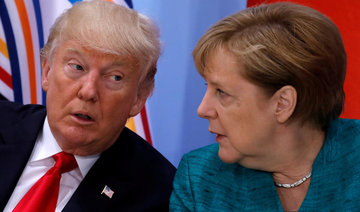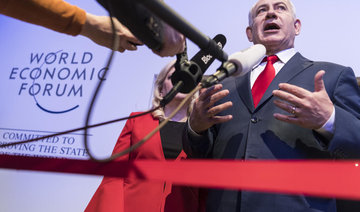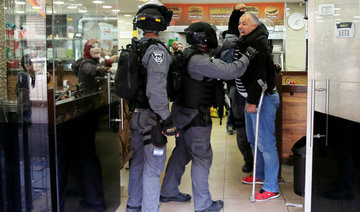WASHINGTON: Under the best of circumstances, a Mideast peace deal is the Holy Grail of diplomacy, a goal that has eluded American presidents for generations.
With Israeli Prime Minister Benjamin Netanyahu set to visit Washington this coming week, the mix of politics, personalities and historical grievances that has stood in the way of Israeli-Palestinian peace is even more combustible than normal.
President Donald Trump’s point man for mediation, Jared Kushner, is in the middle of a political firestorm, his plan remains a mystery and the Palestinians aren’t even speaking to the White House. If that weren’t enough, Netanyahu and Trump are both distracted by mushrooming legal investigations at home.
It’s all contributing to an intensified pessimism in the US, Israel and the West Bank about prospects for a Trump-brokered initiative to succeed.
Kushner and a small team have spent the past year preparing a much-awaited blueprint for peace, but no details have emerged. Many in the region wonder whether the vaunted plan will ever come.
On the surface, Israel’s relationship with the White House has never been better, buoyed by the Jewish state’s thunderous support for Trump’s decision to relocate the US Embassy in Jerusalem and recognize the disputed city as Israel’s capital. The announcements only reinforced Palestinians impressions of Trump as biased against them.
“A mediator will have to mediate between two semi-equal parties. Otherwise it’s not a mediation process,” said Husam Zomlot, the Palestinian ambassador to Washington, in a recent Associated Press interview. “You have to level the field and level your relationship between the two sides in order to be an honest mediator.”
The world may soon be able to judge for itself.
The Trump administration’s peace proposal is near completion, according to US officials, but faces an uncertain future as Kushner, the Trump son-in-law leading the effort, recently lost his top-secret security clearance. Former negotiators say Kushner’s downgraded status probably will severely impair his ability to do the job.
Beneath the veneer of US-Israeli unity, there is lingering disagreement and suspicion.
Israel is increasingly worried that Trump is backsliding on a pledge to “fix” or dismantle the 2015 Iran nuclear deal. Israel also is concerned that behind Trump’s tough public stance toward Tehran is an acquiescence to Iran’s growing presence in Syria and influence in Lebanon — two Israeli neighbors.
“The Israelis now are undoubtedly sounding the alarm,” said Jonathan Schanzer, who researches Iran’s regional influence at the hawkish Foundation for the Defense of Democracies. “The assets the Israelis see on the other side of the border to its north — they are not happy.”
Nevertheless, it’s in Netanyahu’s interest to keep such disputes out of the public eye, said David Makovsky, a former State Department official who worked on Mideast peace negotiations. The Israeli leader faces multiple investigations related to allegations of bribery and corruption.
“It’s important for him not to run afoul of Trump,” said Makovsky, now at the Washington Institute for Near East Policy. “It’s necessary for him to show he’s not so engulfed by his own legal problems that he’s not functioning as a leader.”
Trump and Netanyahu are scheduled to meet Monday, in the middle of the annual American Israel Public Affairs Committee policy conference, which brings thousands of pro-Israel officials, lawmakers, activists and academics to Washington.
Vice President Mike Pence, UN Ambassador Nikki Haley and Trump’s envoy to Israel, David Friedman, will give speeches, and each is likely to hammer away at Iran.
Israel views Iran as an existential threat and Netanyahu has repeatedly implored Trump to “fix it or nix it” when it comes to the nuclear deal. That agreement, negotiated by the Obama administration and other world powers, rewarded Iran with billions of dollars in sanctions relief for curbing its nuclear program.
Critics, including Netanyahu and Trump, say Tehran got too much for too little. Among the remedies they’re advocating: removal of several of the deal’s clauses that allow Iran to gradually resume advanced nuclear work starting in 2024.
Trump has said he won’t renew US waivers for sanctions when they next expire on May 12 unless European countries agree to a new deal that would force them to punish Tehran if the Iranians resume advanced nuclear work. He wants tougher inspections and penalties for Iranian missile testing. He also wants Europe to punish Iran’s support for the anti-Israeli militant group Hezbollah, Yemen’s Houthi rebels and Syrian President Bashar Assad’s government.
Israeli officials are most immediately concerned about Iran’s missile work. They want US and European commitments to punish Iran for work on medium-range missiles capable of hitting Israel and Iran’s Arab rivals. The Europeans have balked, citing UN restrictions that focus only on longer-range projectiles. US officials negotiating with Britain, France and Germany appear to agree with the Europeans, prompting the Israeli concern.
Trump’s Mideast peace aspirations aren’t any more certain. After winning praise in Israel for his Jerusalem proclamation, he made clear the Israelis would have to make concessions, too. He hasn’t said what those might be.
“You won one point, and you’ll give up some points later in the negotiation, if there’s ever a negotiation,” Trump said in January.


New headaches for Donald Trump’s Middle East hopes as Benjamin Netanyahu visits
New headaches for Donald Trump’s Middle East hopes as Benjamin Netanyahu visits

Israel sees spike in PTSD and suicide among troops as war persists
JERUSALEM: Israel is grappling with a dramatic increase in post-traumatic stress disorder and suicide among its troops after its two-year assault on Gaza, precipitated by the October 7, 2023, Hamas attack on southern Israel.
Recent reports by the Defense Ministry and by health providers have detailed the military’s mental health crisis, which comes as fighting persists in Gaza and Lebanon and as tensions flare with Iran.
The Gaza war quickly expanded with cross-border fire between Israel and Lebanon’s Hezbollah, and saw hundreds of thousands of soldiers and reservists deployed across both fronts in some of the heaviest fighting in the country’s history.
Israeli forces have killed more than 71,000 Palestinians in Gaza and 4,400 in southern Lebanon, according to Gazan and Lebanese officials, and Israel says more than 1,100 service members have been killed since October 7.
The war has left much of Gaza destroyed and its 2 million people overwhelmingly lack proper shelter, food or access to medical and health services.
Palestinian mental health specialists have said Gazans are suffering “a volcano” of psychological trauma, with large numbers now seeking treatment, and children suffering symptoms such as night terrors and an inability to focus.
PTSD CASES AMONG ISRAELI SOLDIERS UP 40 percent SINCE 2023
Israeli studies show the war has taken its toll on the mental health of soldiers carrying out Israel’s stated war aims of eliminating Hamas in Gaza, retrieving hostages there and disarming Hezbollah.
Some soldiers who came under attack when their military bases were invaded by Hamas on October 7 are also struggling.
Israel’s Defense Ministry says it has recorded a nearly 40 percent increase in PTSD cases among its soldiers since September 2023, and predicts the figure will increase by 180 percent by 2028. Of the 22,300 troops or personnel being treated for war wounds, 60 percent suffer from post-trauma, the ministry says.
It has expanded the health care provided to those dealing with mental health issues, expanded the budget, and said there was an increase of about 50 percent in the use of alternative treatments.
The country’s second-largest health care provider, Maccabi, said in its 2025 annual report that 39 percent of Israeli military personnel under its treatment had sought mental health support while 26 percent had voiced concerns about depression.
Several Israeli organizations like NGO HaGal Sheli, which uses surfing as a therapy technique, have taken on hundreds of soldiers and reservists suffering from PTSD. Some former soldiers have therapy dogs.
MORAL INJURY OVER DEATHS OF INNOCENTS
Ronen Sidi, a clinical psychologist who directs combat veteran research at Emek Medical Center in northern Israel, said soldiers were generally grappling with two different sources of trauma.
One source was related to “deep experiences of fear” and “being afraid to die” while deployed in Gaza and Lebanon and even while at home in Israel. Many witnessed the Hamas assault on southern Israel — in which the militants also took around 250 hostages back into Gaza — and its aftermath firsthand.
Sidi said the second source is from moral injury, or the damage done to a person’s conscience or moral compass from something they did.
“A lot of (soldiers’) split-second decisions are good decisions,” which they take under fire, “but some of them are not, and then women and children are injured and killed by accident, and living with the feeling that you have killed innocent people... is a very difficult feeling and you can’t correct what you have done,” he said.
One reservist, Paul, a 28-year-old father of three, said he had to leave his job as a project manager with a global firm because “the whistles of the bullets” above his head lingered with him even after returning home.
Paul, who declined to give his last name over privacy concerns, said he deployed in combat roles in Gaza, Lebanon and Syria. Although fighting has abated in recent months, he says he lives in a constant state of alert.
“I live that way every day,” Paul said.
UNTREATED TRAUMA
A soldier seeking state support for their mental health must appear before a defense ministry assessment committee which determines the severity of their case and grants them official recognition. That process can take months and can deter soldiers from seeking help, some trauma professionals say.
Israel’s Defense Ministry says it provides some immediate help to soldiers once they start the evaluation process and has increased this effort since the war began.
An Israeli parliamentary committee found in October that 279 soldiers had attempted suicide in the period from January 2024 to July 2025, a sharp increase from previous years. The report found that combat soldiers comprised 78 percent of all suicide cases in Israel in 2024.
The risk of suicide or self-harm increases if trauma is untreated, said Sidi, the clinical psychologist.
“After October 7 and the war, the mental health institutions in Israel are overwhelmed completely, and a lot of people either can’t get therapy or don’t even understand the distress that they are feeling has to do with what they have experienced.”
For soldiers, the chance of seeing combat remains high. Israel’s military remains deployed in over half of Gaza and fighting has persisted there despite a US-backed truce in October, with more than 440 Palestinians and three Israeli soldiers killed.
Its troops still occupy parts of southern Lebanon, as the Lebanese army presses on with disarming Hezbollah under a separate US-brokered deal. In Syria, Israeli troops have occupied an expanded section of the country’s south since the ouster of former leader Bashar Assad.
As tensions flare with Iran and the US threatens to intervene, Israel could also find itself in another violent confrontation with Tehran, after last June’s 12-day war.
Recent reports by the Defense Ministry and by health providers have detailed the military’s mental health crisis, which comes as fighting persists in Gaza and Lebanon and as tensions flare with Iran.
The Gaza war quickly expanded with cross-border fire between Israel and Lebanon’s Hezbollah, and saw hundreds of thousands of soldiers and reservists deployed across both fronts in some of the heaviest fighting in the country’s history.
Israeli forces have killed more than 71,000 Palestinians in Gaza and 4,400 in southern Lebanon, according to Gazan and Lebanese officials, and Israel says more than 1,100 service members have been killed since October 7.
The war has left much of Gaza destroyed and its 2 million people overwhelmingly lack proper shelter, food or access to medical and health services.
Palestinian mental health specialists have said Gazans are suffering “a volcano” of psychological trauma, with large numbers now seeking treatment, and children suffering symptoms such as night terrors and an inability to focus.
PTSD CASES AMONG ISRAELI SOLDIERS UP 40 percent SINCE 2023
Israeli studies show the war has taken its toll on the mental health of soldiers carrying out Israel’s stated war aims of eliminating Hamas in Gaza, retrieving hostages there and disarming Hezbollah.
Some soldiers who came under attack when their military bases were invaded by Hamas on October 7 are also struggling.
Israel’s Defense Ministry says it has recorded a nearly 40 percent increase in PTSD cases among its soldiers since September 2023, and predicts the figure will increase by 180 percent by 2028. Of the 22,300 troops or personnel being treated for war wounds, 60 percent suffer from post-trauma, the ministry says.
It has expanded the health care provided to those dealing with mental health issues, expanded the budget, and said there was an increase of about 50 percent in the use of alternative treatments.
The country’s second-largest health care provider, Maccabi, said in its 2025 annual report that 39 percent of Israeli military personnel under its treatment had sought mental health support while 26 percent had voiced concerns about depression.
Several Israeli organizations like NGO HaGal Sheli, which uses surfing as a therapy technique, have taken on hundreds of soldiers and reservists suffering from PTSD. Some former soldiers have therapy dogs.
MORAL INJURY OVER DEATHS OF INNOCENTS
Ronen Sidi, a clinical psychologist who directs combat veteran research at Emek Medical Center in northern Israel, said soldiers were generally grappling with two different sources of trauma.
One source was related to “deep experiences of fear” and “being afraid to die” while deployed in Gaza and Lebanon and even while at home in Israel. Many witnessed the Hamas assault on southern Israel — in which the militants also took around 250 hostages back into Gaza — and its aftermath firsthand.
Sidi said the second source is from moral injury, or the damage done to a person’s conscience or moral compass from something they did.
“A lot of (soldiers’) split-second decisions are good decisions,” which they take under fire, “but some of them are not, and then women and children are injured and killed by accident, and living with the feeling that you have killed innocent people... is a very difficult feeling and you can’t correct what you have done,” he said.
One reservist, Paul, a 28-year-old father of three, said he had to leave his job as a project manager with a global firm because “the whistles of the bullets” above his head lingered with him even after returning home.
Paul, who declined to give his last name over privacy concerns, said he deployed in combat roles in Gaza, Lebanon and Syria. Although fighting has abated in recent months, he says he lives in a constant state of alert.
“I live that way every day,” Paul said.
UNTREATED TRAUMA
A soldier seeking state support for their mental health must appear before a defense ministry assessment committee which determines the severity of their case and grants them official recognition. That process can take months and can deter soldiers from seeking help, some trauma professionals say.
Israel’s Defense Ministry says it provides some immediate help to soldiers once they start the evaluation process and has increased this effort since the war began.
An Israeli parliamentary committee found in October that 279 soldiers had attempted suicide in the period from January 2024 to July 2025, a sharp increase from previous years. The report found that combat soldiers comprised 78 percent of all suicide cases in Israel in 2024.
The risk of suicide or self-harm increases if trauma is untreated, said Sidi, the clinical psychologist.
“After October 7 and the war, the mental health institutions in Israel are overwhelmed completely, and a lot of people either can’t get therapy or don’t even understand the distress that they are feeling has to do with what they have experienced.”
For soldiers, the chance of seeing combat remains high. Israel’s military remains deployed in over half of Gaza and fighting has persisted there despite a US-backed truce in October, with more than 440 Palestinians and three Israeli soldiers killed.
Its troops still occupy parts of southern Lebanon, as the Lebanese army presses on with disarming Hezbollah under a separate US-brokered deal. In Syria, Israeli troops have occupied an expanded section of the country’s south since the ouster of former leader Bashar Assad.
As tensions flare with Iran and the US threatens to intervene, Israel could also find itself in another violent confrontation with Tehran, after last June’s 12-day war.
© 2026 SAUDI RESEARCH & PUBLISHING COMPANY, All Rights Reserved And subject to Terms of Use Agreement.












